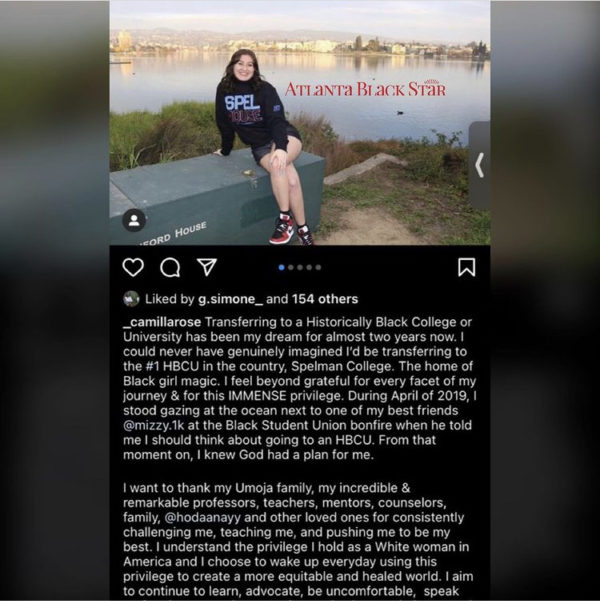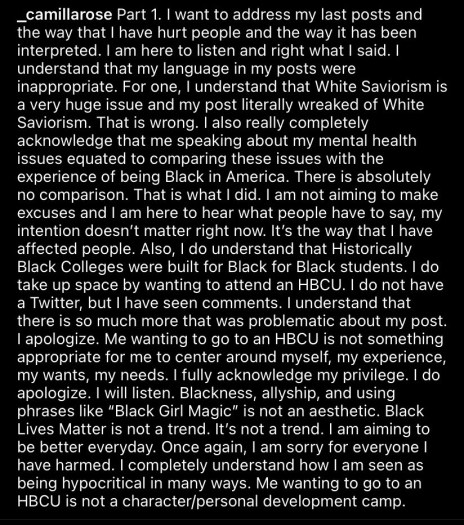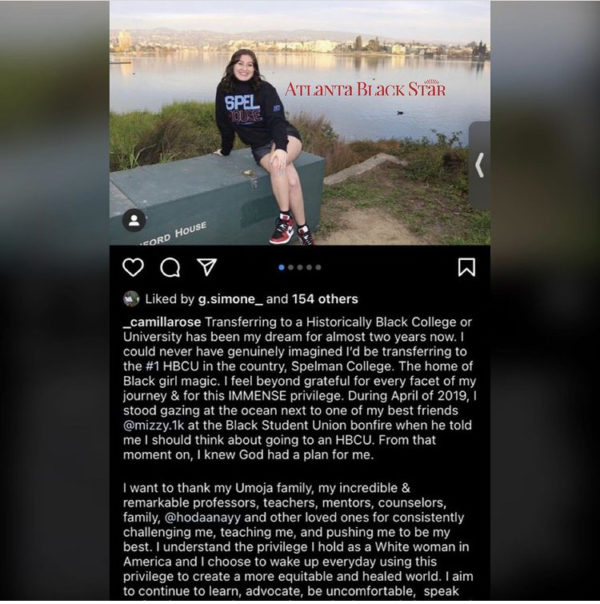‘White Saviorism Is a Very Huge Issue’: White Spelman Student Offers Apology After Onslaught of Criticism for Her Tone In Celebrating Acceptance Letter
A white Instagram user with the handle _camillarose is getting dragged on social media after posting that she was accepted to Spelman College, a prestigious Historically Black College and University in Atlanta.
The student wrote of how she’s dreamed of transferring to an HBCU for two years. She raved about being admitted to the “#1 HBCU in the country,” describing Spelman as “the home of Black girl magic. Reading my acceptance letter was easily one of the best moments of my life, I collapsed to the ground shaking and crying,” she wrote. “I have no words to describe how overjoyed, grateful and READY I feel for this next chapter.”

But that Jaguar pride quickly soured after several social media users took _camillarose to task for how she expressed her enthusiasm.
“It’s weird because the vibe is she’s attending to have a ‘black girl magic’ experience,” @kaydotmarie tweeted Sunday night. “How you gonna do that in a white body? There have been people of no color at HBCU’s before and they’re usually there for the academics and programs… not to try out blackness.”
Spelman trended as many of her critics took to Twitter to weigh in, calling the post “strange,” “off-putting” and a showcasing of “white saviorism.”
Atlanta Black Star did not receive a response to requests for comments from _camillarose. Additionally, she deleted her Instagram page on Monday, Dec. 7. Under the federal law Family Educational Rights and Privacy Act, Spelman College is not allowed, without consent, to provide “personally identifiable information from an eligible student’s education records,” such as a student’s name.
In her Instagram post, _camillarose thanked professors, teachers, mentors, counselors and her Umoja family for helping in her admission to Spelman.
“I understand the privilege I hold as a White woman in America and I choose to wake up everyday using this privilege to create a more equitable and healed world. I aim to continue to learn, advocate, be uncomfortable, speak up for change and use my time at Spelman to help catapult…”
Spelman is the sister school of Morehouse College and part of the Atlanta University Center. The private liberal arts college is the oldest historically Black college for women in America. Spelman is among the most selective women’s colleges in the nation with an acceptance rate of 41 percent.
Spelman, like all HBCUs, has no policies against accepting white students. In 2008, Morehouse saw its first white valedictorian, Joshua Packwood, graduate.
Originally named the Atlanta Baptist Female Seminary, Spelman College was founded for Black freedwomen in 1881 by two white Massachusetts educators, Harriet E. Giles and Sophia B. Packard. John D. Rockefeller soon became one of the college’s biggest donors. Three years after it was founded, the school was renamed Spelman Seminary, after Rockefeller’s activist wife, Laura Spelman Rockefeller, and her parents Harvey Buel and Lucy Henry Spelman, longtime activists in the antislavery movement.
Still, _camillarose’s post touched a nerve, with some defending her right to attend an HBCU while others knocked her for what they see as encroaching on spaces reserved for Black students.
“All I can think about are my friends who wanted to go to Spelman but couldn’t because it was too expensive,” Twitter user David Dupree Jr. posted in a retweet.
The post had Twitter’s HBCU community in a frenzy. It prompted memes, GIFs and thousands of comments with lively debates surrounding the boundaries of white students on historically Black campuses.
In her post, _camillarose went on to tackle her own struggles with mental health and suicidal thoughts.
“While I have never struggled due to the color of my skin, I have spent my entire life dealing with debilitating mental health issues,” she wrote. “In the past few years especially, my anxiety, depression, OCD, and eating disorder consumed my life. At one point in 2020, I did not have a desire to be alive anymore. I felt completely consumed by what I was encountering internally. Through deep work and bringing out tools from years in therapy and treatment, I am now more resilient than ever. I shared these battles with the admissions committee at Spelman and despite this, I have been accepted with open arms.”
One Twitter user, @WoomyM_, who identified herself as a Clark Atlanta University student, found it odd that she made such a correlation.
“Are we gonna talk about the last paragraph where she compared racism to mental health issues? Because that was strange asl,” she wrote.
“I ain’t even invalidating, but why was that comparison made,” she added.
Clark Atlanta University is another school among the Atlanta University Center complex that includes Spelman and Morehouse College. Layla Louis, who said she is a sophomore at Clark Atlanta, told Atlanta Black Star via email on Monday what bothered her about the posts from _camillarose.
“As someone who has now attended two HBCUs (originally I went to Howard University then I transferred to Clark Atlanta), those places are a haven of Black thought,” Louis began.” There is nothing wrong with being not Black in these spaces but to do so vocally is something that doesn’t sit right with me. Spelman particularly, is as an institution that was created with Black Women in mind; sure there have been white Spelmanites before, yet the common comment that most Spelmanites seem to have is that to take up space in a Black space is something that is already not taken positively, yet to do so vocally and to compare a mental disability to the plight of Black women when discussing your ‘qualifications’ to attend Spelman College is not a good look.”
_camillarose later issued an apology, saying she was “here to listen” and conceded that the language in her post was inappropriate.
“I understand that White Saviorism is a very huge issue and my post literally wreaked of White Saviorism. That is wrong,” _camillarose wrote. “I also really completely acknowledge that me speaking about my mental health issue equated to comparing these issues with the experience of being Black in America. There is absolutely no comparison. That is what I did.”



 (@WoomyM_)
(@WoomyM_)